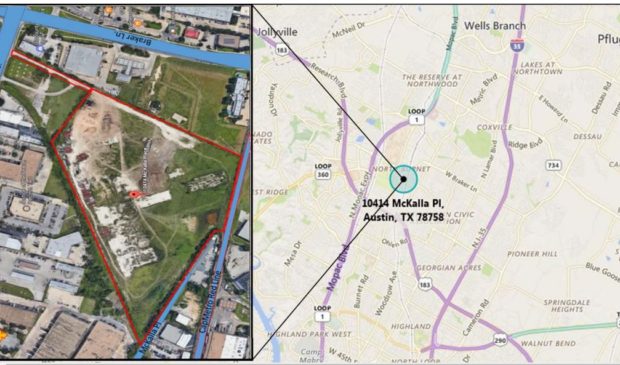Council offers questions, praise and frustration amid McKalla presentations
Wednesday, August 8, 2018 by
Chad Swiatecki Threaded between questions and comments Tuesday about alternative proposals to develop the city’s McKalla Place tract was frustration. Many members of City Council bemoaned the hurried decision-making process that has put the city, area developers and the owners of a professional soccer team into something of a three-way struggle.
The special session on Tuesday was an opportunity for Council to hear presentations on the half-dozen mixed-use and parks proposals for 10414 McKalla Place. The city-owned land is the suggested location for a 20,000-seat stadium that would become the home for a relocated Major League Soccer team.
Those alternative plans have drawn support from neighbors in the North Austin area near the Domain, who have said the city is allowing soccer ownership group Precourt Sports Ventures to dictate the deadline for a stadium deal since proposing the move last fall. Council is expected to vote on whether to move forward with a final agreement at Thursday’s meeting.
“I am ambivalent about MLS as a proposal and I find it frustrating because in conversations I’ve had with some folks I would have loved to see an MLS proposal from PSV that included a hotel, that included additional buildings and more development. But the response has been that ‘I don’t think the neighborhood is going to want that much density,’” Council Member Jimmy Flannigan said.
“This process has been one of the most frustrating and mind-blowing experiences in my short time on Council. I’d love to dig into these proposals that are going to require me to take answers from developers with no vetting. Can I take info from a developer without it being fully vetted? I don’t think that I can.”
Tuesday’s presentations saw some of the developers rack up more than 100 hours of research and design to prepare their business plans for the 24-acre site, despite no guarantee that they’ll be formally considered by the city. The alternative proposals were only for comparison purposes. A formal “request for proposal” process wasn’t opened because doing so would take more time than PSV allowed in its offer to bring Austin its first major league sports franchise.
“We asked to have an RFP process. We asked to have a different process with PSV but we were denied,” Council Member Alison Alter said. “So if we are here where we are now it’s because we were unable to have a process that is worthy of our city.”
The current term sheet for the possible deal would see PSV construct the $200 million stadium on its own, using the McKalla property for free for five years and paying $550,000 per year in rent for the duration of its 20-year lease.
Behind the scenes on Tuesday, Alter and Council members Leslie Pool, Ellen Troxclair and Ora Houston worked to put together a package of amendments to Thursday’s agenda item that would potentially saddle PSV with millions more in costs for the project. The team’s representatives have said recently that the concessions included in the current term sheet, without the new amendments, represent its maximum financial commitment.
Pool also offered a side-by-side comparison of the McKalla stadium proposals compared to a new MLS stadium deal in Miami, and criticized the pace and short time frame of the negotiations for the Austin soccer effort.
“We have been given arbitrary deadline after arbitrary deadline by the good people with Precourt and MLS, and that’s not the Austin way,” she said. “What you see here is Austin standing up and saying that it’s not the Austin way.”
The presentation portion of the session saw developers emphasizing the financial and community advantages their projects would offer compared to the PSV stadium deal.
Scott Moxham, chief financial officer for Capella Capital Partners, said the two plans submitted by his company would bring high-paying jobs, affordable housing and assortment of cultural offerings to the area.
“There’s a lot of beautiful things about sports and qualitative aspects that are hard to quantify, but soccer is not a huge job creator,” he said. “The $233 million (in economic impact) that’s straight from Precourt’s slide deck … the assumptions are 800 jobs at $12 an hour for the folks that sell concessions, and they’ll have roughly 100 full-time employees at $50,000 a year. Under a mixed-use component with office (space) it’s not a wild assumption to see 2,500 employees there during the day, and the payroll there under conservative assumptions gets you to $2.5 billion over a 23-year period.”
Marcus Whitfield, a partner in a development firm who offered this summer to buy the property from the city for $22.5 million, said he’d like to see a more formal process used to determine how to best use city land that some conservationists argue is ecologically valuable.
“What I hear is that there is some process-oriented concerns from the neighbors and City Council members themselves and I think the paramount concern that’s being heard is about ‘What process did we follow?’ to get where we are, and don’t let this happen again,” he said. “This is more civic-oriented because this land is taxpayer-owned and as a taxpayer I feel like it’s a civic duty, just like the Sierra Club does, to protect those wetlands.”
Map courtesy of the city of Austin.
The Austin Monitor’s work is made possible by donations from the community. Though our reporting covers donors from time to time, we are careful to keep business and editorial efforts separate while maintaining transparency. A complete list of donors is available here, and our code of ethics is explained here.
You're a community leader
And we’re honored you look to us for serious, in-depth news. You know a strong community needs local and dedicated watchdog reporting. We’re here for you and that won’t change. Now will you take the powerful next step and support our nonprofit news organization?




